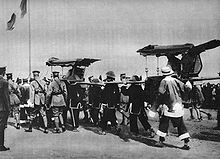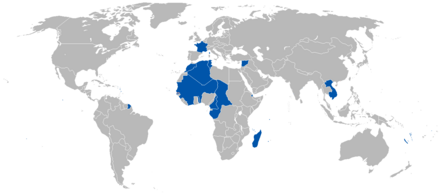Martial Merlin
Martial-Henri Merlin (born January 20, 1860 in Paris ; † May 7 or 8, 1935 there ) was a French colonial administrator who was active in large parts of the French colonial empire over the course of his long career and who was particularly successful in Africa could. As a supporter of conservative positions and proponent of a strict law-and-order policy , he was opposed to political liberalization in the colonies.
Life
Early career
Merlin entered the French colonial administration in 1887 after five years of military service (1880–85). He was first resident of the Gambier Islands and from 1889 of the Marquesas Islands in Polynesia .
From 1891 he worked in Senegal , where he headed the Bureau des affaires politiques . In this position he was responsible for the surveillance, arrest and exile of the Sufi mystic Amadu Bamba .
Governor Henri-Félix de Lamothe became his sponsor during this period. After he was transferred to French Congo , Merlin followed him there in 1897 and received the newly created post of Secretary General of the Colonial Administration. From October 1898 to April 1899 he ran the colony as a substitute during Lamothes absence.
In the same year, Merlin moved from Martinique to the Caribbean as General Secretary . From 1901 to the end of 1902 he served as governor of Guadeloupe .
Governor General in the African colonies
After his return to French West Africa , Merlin served repeatedly as governor general of the colony in 1903, 1904 and 1905 on behalf of Ernest Roume . Amadu Bamba, who has since returned, was again sent into exile. Parallel to such restrictive actions, Merlin also tried to develop the colony further, for example in Dakar he had a nature park (today's Hann Zoo ) laid out. After Roume gave up his post in late 1907 and left Africa, Merlin ruled as governor-general until March 1908.
In June 1908 he became the first governor general of French Equatorial Africa and organized the amalgamation of the previously independent territories into one large colony. In 1909 he had a rebellion suppressed in Ubangi-Shari . In the following years, the overthrow of the last indigenous empires in the depths of Central Africa (such as Wadai ) took place under his administration . On March 9, 1910, Merlin gave a speech on this subject at a gala dinner at the Union coloniale , which is considered a prime example of the justification of colonialism in the sense of mission civilisatrice :
“We have penetrated into new countries. We went there with the virtue of the right of a civilized, fully developed race, to occupy those territories which were left fallow by backward peoples who have remained behind in barbarism and cannot utilize the riches of their soil. This is a right that we have exercised and of which we will always say bindingly that we have the right to exercise it. We have the right to go to these peoples, we have the right to occupy their lands, but by exercising this right we impose an obligation on them that we must never lose sight of for a moment. "
Merlin's administration was considered tough but effective. He campaigned for concession companies , legalized forced labor and extended the poll tax to women. During the First World War he organized an auxiliary column to support the invasion of German Cameroon and was later awarded the Citation à l'ordre de la Nation . His term of office ended in May 1917.
From July 1917 he served as governor general of Madagascar for one year . From September 1919 to March 1923 he was again - but this time regularly - Governor General of West Africa. With the support of the center-right coalition Bloc national, Merlin tried to restore the old colonial structures of pre-war rule, which met with fierce resistance from the educated local elite. His tenure was soon dominated by a bitter power struggle between him and the left Senegalese politician Blaise Diagne . Diagne was ultimately able to arrange Merlin's transfer behind the scenes at Paris.
Indochina

In August 1923, Merlin was appointed Governor General of French Indochina to succeed the late Maurice Long . From the Paris Poincaré government he was given the task of restoring the financial budget of Indochina and significantly reducing expenditure. Merlin focused on promoting the economy; his cuts mainly affected the education sector. He increased the primary school budget, but at the same time drastically reduced the funds for secondary schools and had university scholarships abolished. Since he also stopped teaching French in elementary schools, it became much harder for locals to get into high school. These measures, which ended the progressive-liberal reform phase of his predecessors, Sarraut and Long, were correspondingly unpopular and brought Merlin the hostility of the local elite. The mostly right-wing conservative French settlers, who saw their supremacy threatened by the growing self-confidence of the indigenous population, welcomed Merlin's approach.
Similarly problematic was Merlin's tacit tolerance of the highly corrupt rule of his subordinate Maurice Cognacq , the governor of Cochinchina . Like Merlin, Cognacq took conservative positions.
In April 1924 Merlin visited the neighboring Chinese province of Yunnan to the north , which was regarded as a French sphere of influence. The following June he traveled to Japan . On the way back he visited Canton in Guangdong . On June 19, a banquet hosted by the local British concession was held at the Victoria Hotel in his honor. During the festivities, the Vietnamese nationalist Phạm Hồng Thái (a member of the Tâm Tâm Xã ) tried to kill Merlin with an explosive device; however, this survived largely unharmed. Shortly afterwards, the assassin committed suicide while on the run by drowning himself in the Pearl River . The French authorities blamed Phan Bội Châu and Cường Để for the attack.
After Merlin had still not got the budget problems under control in the spring of 1925 despite good economic growth and extremely unpopular austerity measures, it became apparent that he could not meet the high expectations placed in him. In July 1925 he was finally called back to the motherland by the new left government. As governor general, he was succeeded by the more liberal Alexandre Varenne .
From 1926 to 1934 he was the representative of France in the Permanent Mandate Commission of the League of Nations - in fact an insignificant assembly of elderly former colonial officials. He died in Paris on May 7 or 8, 1935, at the age of 75.
Family and private
Merlin's brother was the editor-in-chief of Le Temps newspaper , so he had some influence on public opinion in the motherland.
In 1896 Martial married Merlin Madeleine Daireaux , with whom he had three children: Henry-Martial (1897, later magazine publisher), Marie-Rosé (1899) and Anne-Marie (1901). In 1911 he divorced his wife and married her sister Marthe Daireaux, with whom he had their son André, who was born in the same year (later a successful tennis player).
Merlin was a freemason .
Awards and honors
For his achievements in the colonies, Merlin was made a Grand Officer of the Legion of Honor . He held the title of Honorary Governor General ( gouverneur général honoraire des Colonies ), was a member of the central commission of the Paris Société de Géographie and honorary member of the Société de geographie et d'études coloniales de Marseille .
Paul Chabanaud named the pseudo dwarf clawed frog Pseudhymenochirus merlini , native to West Africa, after Merlin in 1920 . Ornithologists Delacour and Jabouille named a species from the genus of the wood partridge , the yellow-footed partridge , Arborophila merlini , in his honor in 1924 .
Individual evidence
- ↑ a b c Dick van Galen Last: Black Shame: African Soldiers in Europe, 1914–1922 , Bloomsbury, London 2015, p. 127
- ↑ a b c d Société de Géographie : La Géographie: Terre - Air - Mer. Bulletin de la Société de geographie, Volume 64-1, Paris, July 1935, obituary , p. 64 ( digitized from Gallica )
- ^ Cheikh Anta Mbacké Babou: Fighting the Greater Jihad: Amadu Bamba and the Founding of the Muridiyya of Senegal, 1853–1913 , Ohio University Press, Athens OH 2007, pp. 121–125
- ↑ a b worldstatesmen.org: French Equatorial Africa (AEF) (accessed September 2017)
- ↑ Ministère de l'Environnement et de la Protection de la nature: Direction des parcs forestier et zoologique de Hann (Internet Archive, 2012)
- ↑ a b worldstatesmen.org: French West Africa (AOF) (accessed September 2017)
- ^ Translation from French: "Nous sommes allés vers de terres nouvelles. Nous y sommes allés en vertu du droit qu'a une race civilisée, une race faite, d'occuper les territoires qui sont laissés en jachère par des populations attardées dans la barbarie et qui ne peuvent pas mettre en exploitation les richesses que possède leur sol.C'est un droit que nous avons exercé et quand on vous dira maintenez fermement que c'est un droit que nous exerçons.Nous avons le droit d'aller chez ces peuples, nous avons le droit d'occuper leurs terres, mais immédiatement, l'exercice de ce droit nous impose vis-à-vis d'eux des devoirs que nous ne devons à aucun instant perdre de vue. " Quoted in: Ch. Didier Gondola: Africanisme: la crise d'une illusion , L'Harmattan, Paris 2007, p. 51
- ↑ Richard Bradshaw, Juan Fandos-Rius: Historical Dictionary of the Central African Republic , Rowman & Littlefield, Lanham MD 2016, p. 444 (entry MERLIN, MARTIAL HENRI (1860–1935) )
- ↑ worldstatesmen.org: Madagascar (accessed September 2017)
- ^ Martin Thomas: The French Empire Between the Wars: Imperialism, Politics and Society , Manchester University Press, 2005, p. 26
- ↑ worldstatesmen.org: French Union of Indo-China (accessed September 2017)
- ↑ Bruce M. Lockhart, William J. Duiker : The A to Z of Vietnam , Scarecrow Press, Lanham MD 2010, pp. 234/235 (entry MERLIN, MARTIAL (1860–1935) )
- ↑ Justin Corfield: Historical Dictionary of Ho Chi Minh City , Anthem Press, London 2014, p. 318 (entry MERLIN, MARTIAL-HENRI (1860–1935) )
- ↑ KW Taylor : A History of the Vietnamese , Cambridge University Press, 2013, pp. 499/500
- ^ Hue-Tam Ho Ta: Radicalism and the Origins of the Vietnamese Revolution , Harvard University Press, Cambridge MA 1996, p. 134
- Jump up ↑ Geoffrey C. Gunn: Rice Wars in Colonial Vietnam: The Great Famine and the Viet Minh Road to Power , Rowman & Littlefield, Lanham MD 2014, p. 50
- ^ Joseph Buttinger: Vietnam: a Dragon Embattled: Vietnam at war , Praeger, New York 1967, pp. 1220/1221
- ^ Susan Pedersen: The Guardians: The League of Nations and the Crisis of Empire , Oxford University Press, 2015, pp. 62, 111, 294
- ↑ L'Intermédiaire des chercheurs et curieux. November 1983 edition, Paris, anthology pp. 1163/1164
- ↑ Patrice Morlat: Indochine années vingt: le balcon de la France sur le Pacifique. Les Indes savantes, Paris 2001, p. 245
- ^ Société de geographie et d'études coloniales de Marseille: Bulletin de géographie d'Aix-Marseille , volumes 56–59, 1936, p. 125 (obituary)
- ↑ Bo Beolens, Michael Watkins, Michael Grayson: The Eponym Dictionary of Amphibians , Pelagic Publishing, Exeter 2013, entry Merlin
- ↑ Bo Beolens, Michael Watkins, Michael Grayson: The Eponym Dictionary of Birds , Christopher Helm Bloomsbury Publishing, London 2014, entry Merlin, MH
| personal data | |
|---|---|
| SURNAME | Merlin, Martial |
| ALTERNATIVE NAMES | Merlin, Martial-Henri (full name) |
| BRIEF DESCRIPTION | French colonial administrator |
| DATE OF BIRTH | January 20, 1860 |
| PLACE OF BIRTH | Paris |
| DATE OF DEATH | May 7, 1935 or May 8, 1935 |
| Place of death | Paris |

